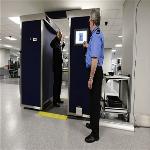07 January 2010

Photo: AP
Security personnel demonstrating a new full body security scanner at Manchester Airport, Manchester, England, 07 Jan 2010
European aviation officials are meeting in Brussels to discuss airport security measures and British authorities are doing the same as governments try to decide the best way to protect planes and air passengers in the wake of a failed bombing attempt on an American airliner on Christmas day.
The European Commission's aviation experts are meeting Thursday according to commission spokesman Fabio Pirotta.
"It is a meeting of aviation security committee and they are meeting to take stock of the situation following the incidents that happened over the holidays," he said.
While Pirotta would not say exactly what the committee will address, full body scanners are likely to be on the agenda. European nations are divided as to whether to deploy them in airports. Officials from some countries, like Germany have cited health and privacy issues.
The Netherlands and Britain have announced they will install scanners in the coming weeks.
Barbara Hellfferich, another commission spokesperson, says there are currently no European Union rules preventing member states from introducing body scanners and the European commission's position is clear.
"It considers body scanners, if they meet the health standards and security standards, as a useful additional tool provided they do not contradict existing European legislation," she said.
In Britain, the heads of airport security are meeting with government officials to discuss rolling out new security measures. The British prime minister's announcement this week that scanners will be in U.K. airports in the next three weeks has sparked protest from civil liberties campaigners such as Simon Davies, of the group Privacy International.
"Here you have a machine that electronically strip searches people," he said. "It strip searches them regardless of age or innocence, children, grandmothers, whomever. The reality is this is yet another assault on the dignity of the public and rights of the public. Now if you could prove that the machines are essential to protection of our security, then I would say the use is proportionate."
Davies says he objects to the scanners not only because of privacy issues, but also because he says they are a waste of money.
"From a security perspective, money should be diverted to tried and tested proven methods of counter terrorism. Why divert finite resources to something which does not work, which has never ever been proved to work, just on speculation, on hypothesis that at sometime in the future it may?" he asked.
Aviation analyst Chris Yates says the scanners are effective, but have to be used with other security screening methods.
"Body scanners in and of themselves provide an additional capability, in terms of aviation security, but they are by no means the only answer. Body Scanners are only the first element, we need to look at the profiling, we need to also look at the liquid aspect. We need to look at advanced technology as well," said Yates.
That advanced technology includes trace detectors that can determine whether someone' was touched or been exposed to explosive material. U.S. President Barack Obama called the failed Christmas day bombing an intelligence failure. Yates says intelligence is only part of keeping travelers safe.
"Security has always got to be a mix of technique and technology. So on the technique side, there has to be advances in the profiling of passengers, but not necessarily in terms of ethnicity, religion and so forth," Yates added.
It is not clear whether body scanners would have identified the failed Christmas day bomber, because they do not always detect liquids or plastic. Aviation officials say it was lucky the bomb did not detonate properly. European governments are working to find aviation security measures that will not rely on luck.